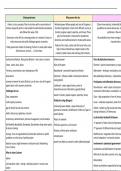Urban governance Who governs the city
Urban is a fuzzy concept of the city territory with a concentration of Relational power follows people and rules of the game, is Citizens have electoral, referendial (di
features shaped by actors in and outside the administrative boundaries therefore fragmented. It stems from different sources as possibilities to execute democracy. Es
who follow their ways of life. function, popular support, expertise, and money. These politicians in the aren
play into how power is measured in reputational,
Governance is the shift to a steering position in a network of actors to All possibilities have short comings, b
decisional, and coalitional power to create public values.
unlock resources and tackle challenges against constraints. characteristics a
Positions from state, market and third sector who score
Urban governance implies the steering of actors to create public values
high in these methods have a higher impact on the
(infrastructure, services, . . ) in the urban.
creation of public values and achieving their interests.
Dysfunctional Nations, Rising cities (Barber) = cities closer to citizens Relational power Direct & plebiscitary democracy
Urban - admin, dens, divers Rules of the game Electoral – system (representatory vs major
Territory, concentration, actor shaping way of life Reputational – perceived importance (Hunter) Referendum – binding or consultative, citize
Governance Decisional – influence visible in controversial decision New plebiscitary democracy – implementat
making (Dahl)
steering in network of actors (Peters): Loss of rains, rules of the game Participatory and deliberative democracy
against polit, inst & econom constraints Coalitional – urban regime theory, center of
Non-electoral – what is open to discussion
network/resources/ information, agenda (Stone)
Challenges Da Cruz involvement (informative, consultation, co-
Sources: function, popular support, expertise, money
Data, comparative Close – high cooperation in form of interact
Pulling the strings (Boogers)
instit & policy outcomes Loose – moderate cooperation, divers form
Community power debate - power dimension of
gap of scholar focus & real concerns Distant – bottom up, Big society and releva
governance networks, identification of elites via Types of
lacking institutions, DIY democracy
politic: democracy, legitimacy, inclusion power (above)
Local elections Gendzwitt & Steyvers
technocracy: administration, technical management, and innovation Players in networks
1st approach: of lower rank and importance
(In) flexibility, Availability, Complexity, Coordination shape urban policy, Politicians, governors, civil servants
& decision making 2nd approach: of different kind and strong h
Directors of third sector institutions
Synergy: focus on organizational/ technocratic solutions to specific Multilevel turn: integration with critical exa
entrepreneurs
problems or on the locus of political power vertical integration + horizontal variation
power from ability to connect to other influential people
Base for success: legal framework, multiscale instut. Relationship, Involvement in subnational government H
innov. Policies
Acceleration and hybridization of represent
What Is urban Cochrane
Roll back of state after economic crisis, digi
Admin:
Observations:
city boarders≠ urban – change + political practices + tension cross
Bottom-up initiatives supported by local go
border





